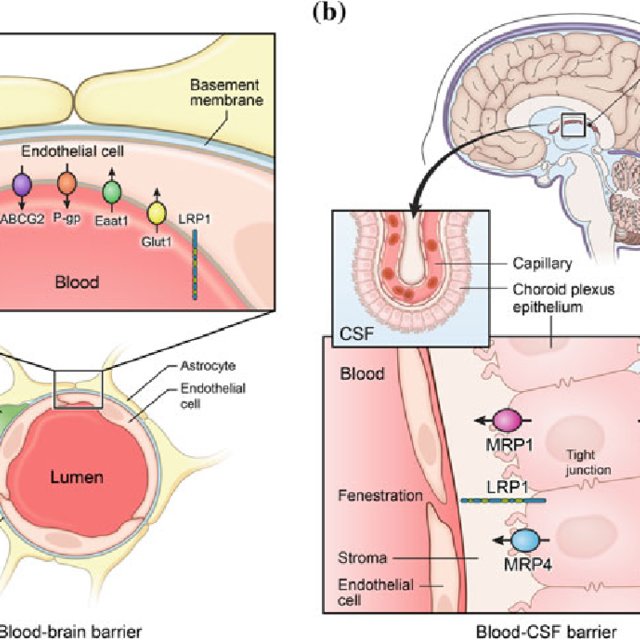The Blood Brain Barrier is a biological structural border of semi-permeable nature made up of endothelial cells of capillaries, the capillary walls, the astrocyte glial cells, and the pericytes which are fixed in the basement membrane of the capillaries. The astrocytes as part of the barrier generally provide biochemical support to the endothelial cells and nutrients to the neurons. This barrier essentially prevents the movement of solutes from the blood flowing in the blood vessels and capillaries in the Brain from moving into the space and the extracellular fluid surrounding the neurons. Like skull provides mechanical protection to the brain, and the meninges (dura mater, arachnoid and pia mater from outside to inside) provide a structural stability and integrity, the blood brain barrier provides nutritional and biochemical filters for the fluid environment inside the brain.
Recent research has pointed out the crucial role of the astrocytes as glial cells and as support in the BBB.
The leaking of the blood brain barrier is known to be associated with aging. It has been found out that the astrocytes release factors (which include GDNF, BDNF, NGF and others) which are needed to maintain the health of the neurons. Some of the factors released by the Astrocytes help in maintaining tight connections among the cells in the blood brain barrier.
Researchers at the Fralin Biomedical Research Institute and Virginia Tech School of Neuroscience were involved in the study.
In FBRI, a small number of astrocytes were genetically ablated (removed) in adult mice to study the role of these glial cells in the blood brain barrier. In this study, small, intermediate and large molecular weight tracers were used to study the changes in the permeability of the blood brain barrier after astrocyte ablation. All of the marker tracers passed through the BBB in certain areas, while in some areas only the tracers with small molecular weights passed. This indicates that the leakages occurring due to absence of astrocytes were happening in different sizes.
This study is important in terms of literature of the studies on the role of astrocytes in the blood brain barrier. This is because researchers state that there are cases where such studies are either left with no further citations or face the possibility of studies which counter the findings.
This study is relevant as the health of the blood brain barrier is found to be correlated to the prevalence of neuro-degenerative diseases and that the astrocytes are important for the structural and functional integrity of BBB.





